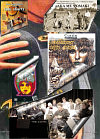Alexandria Virtual Cultural Centre of WA
....I PROPOSE to treat of Poetry in itself and of its various kinds, noting the essential quality of each, to inquire into the structure of the plot as requisite to a good poem; into the number and nature of the parts of which a poem is composed; and similarly into whatever else falls within the same inquiry. Following, then, the order of nature, let us begin with the principles which come first.
Epic poetry and Tragedy, Comedy also and Dithyrambic poetry, and the music of the flute and of the lyre in most of their forms, are all in their general conception modes of imitation. They differ, however, from one another in three respects - the medium, the objects, the manner or mode of imitation, being in each case distinct.
For as there are persons who, by conscious art or mere habit, imitate and represent various objects through the medium of colour and form, or again by the voice; so in the arts above mentioned, taken as a whole, the imitation is produced by rhythm, language, or 'harmony,' either singly or combined.
Thus in the music of the flute and of the lyre, 'harmony' and rhythm alone are employed; also in other arts, such as that of the shepherd's pipe, which are essentially similar to these. In dancing, rhythm alone is used without 'harmony'; for even dancing imitates character, emotion, and action, by rhythmical movement.
There is another art which imitates by means of language alone, and that either in prose or verse - which verse, again, may either combine different meters or consist of but one kind - but this has hitherto been without a name. For there is no common term we could apply to the mimes of Sophron and Xenarchus and the Socratic dialogues on the one hand; and, on the other, to poetic imitations in iambic, elegiac, or any similar meter. People do, indeed, add the word 'maker' or 'poet' to the name of the meter, and speak of elegiac poets, or epic (that is, hexameter) poets, as if it were not the imitation that makes the poet, but the verse that entitles them all to the name. Even when a treatise on medicine or natural science is brought out in verse, the name of poet is by custom given to the author; and yet Homer and Empedocles have nothing in common but the meter, so that it would be right to call the one poet, the other physicist rather than poet. On the same principle, even if a writer in his poetic imitation were to combine all meters, as Chaeremon did in his Centaur, which is a medley composed of meters of all kinds, we should bring him too under the general term poet.
So much then for these distinctions.
There are, again, some arts which employ all the means above mentioned - namely, rhythm, tune, and meter. Such are Dithyrambic and Nomic poetry, and also Tragedy and Comedy; but between them originally the difference is, that in the first two cases these means are all employed in combination, in the latter, now one means is employed, now another.
Such, then, are the differences of the arts with respect to the medium of imitation.
...Tragedy is the imitation of an action; and an action implies personal agents, who necessarily possess certain distinctive qualities both of character and thought; for it is by these that we qualify actions themselves, and these - thought and character - are the two natural causes from which actions spring, and on actions again all success or failure depends. Hence, the Plot is the imitation of the action - for by plot I here mean the arrangement of the incidents. By Character I mean that in virtue of which we ascribe certain qualities to the agents. Thought is required wherever a statement is proved, or, it may be, a general truth enunciated….
….For Tragedy is an imitation, not of men, but of an action and of life, and life consists in action, and its end is a mode of action, not a quality. Now character determines men's qualities, but it is by their actions that they are happy or the reverse. Dramatic action, therefore, is not with a view to the representation of character: character comes in as subsidiary to the actions. Hence the incidents and the plot are the end of a tragedy; and the end is the chief thing of all. Again, without action there cannot be a tragedy; there may be without character….
……if you string together a set of speeches expressive of character, and well finished in point of diction and thought, you will not produce the essential tragic effect nearly so well as with a play which, however deficient in these respects, yet has a plot and artistically constructed incidents. Besides which, the most powerful elements of emotional interest in Tragedy - Peripeteia or Reversal of the Situation, and Recognition scenes - are parts of the plot. A further proof is, that novices in the art attain to finish of diction and precision of portraiture before they can construct the plot……
………The plot, then, is the first principle, and, as it were, the soul of a tragedy; Character holds the second place.…
…….Third in order is Thought- that is, the faculty of saying what is possible and pertinent in given circumstances….
…….Fourth among the elements enumerated comes Diction; by which I mean, as has been already said, the expression of the meaning in words……..
……. Of the remaining elements Song holds the chief place among the embellishments.
The Spectacle has, indeed, an emotional attraction of its own, but, of all the parts, it is the least artistic, and connected least with the art of poetry....
…..according to our definition Tragedy is an imitation of an action that is complete, and whole, and of a certain magnitude; for there may be a whole that is wanting in magnitude. A whole is that which has a beginning, a middle, and an end. A beginning is that which does not itself follow anything by causal necessity, but after which something naturally is or comes to be. An end, on the contrary, is that which itself naturally follows some other thing, either by necessity, or as a rule, but has nothing following it. A middle is that which follows something as some other thing follows it….
……we may say that the proper magnitude is comprised within such limits, that the sequence of events, according to the law of probability or necessity, will admit of a change from bad fortune to good, or from good fortune to bad…
…..the plot, being an imitation of an action, must imitate one action and that a whole, the structural union of the parts being such that, if any one of them is displaced or removed, the whole will be disjointed and disturbed. For a thing whose presence or absence makes no visible difference, is not an organic part of the whole…
…….the poet or 'maker' should be the maker of plots rather than of verses; since he is a poet because he imitates, and what he imitates are actions. And even if he chances to take a historical subject, he is none the less a poet; for there is no reason why some events that have actually happened should not conform to the law of the probable and possible, and in virtue of that quality in them he is their poet or maker….
…..Reversal of the Situation is a change by which the action veers round to its opposite, subject always to our rule of probability or necessity. Thus in the Oedipus, the messenger comes to cheer Oedipus and free him from his alarms about his mother, but by revealing who he is, he produces the opposite effect…
…..Recognition, as the name indicates, is a change from ignorance to knowledge, producing love or hate between the persons destined by the poet for good or bad fortune…
…..If an enemy kills an enemy, there is nothing to excite pity either in the act or the intention- except so far as the suffering in itself is pitiful. So again with indifferent persons. But when the tragic incident occurs between those who are near or dear to one another- if, for example, a brother kills, or intends to kill, a brother, a son his father, a mother her son, a son his mother, or any other deed of the kind is done- these are the situations to be looked for by the poet……
…..As for the story, whether the poet takes it ready made or constructs it for himself, he should first sketch its general outline, and then fill in the episodes and amplify in detail…..
…..Every tragedy falls into two parts- Complication and Unraveling or Denouement. Incidents extraneous to the action are frequently combined with a portion of the action proper, to form the Complication; the rest is the Unraveling. By the Complication I mean all that extends from the beginning of the action to the part which marks the turning-point to good or bad fortune. The Unraveling is that which extends from the beginning of the change to the end……
...as regards Diction. One branch of the inquiry treats of the Modes of Utterance. But this province of knowledge belongs to the art of Delivery and to the masters of that science. It includes, for instance, -- what is a command, a prayer, a statement, a threat, a question, an answer, and so forth. ...
Aristotle (384 BC-322 BC)
Translated by S. H. Butcher
Alexandria - Acting on the brighter future for the professional arts in Australia




